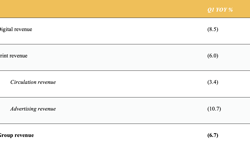My Digital Life: A Review Of What We Know About Digital Consumers argues the case for a well-defined online brand which is not afraid to present content with both audience demand and emerging user behaviour in mind.
The study, which reviews the wealth of information currently available in the public domain, was commissioned by AOP’s Futures group and explored four emerging mega-trends in content consumption.
| The Four Mega Trends * Participation 73 per cent of 18-24 year-olds posting comments online weekly * On-demand Digital music downloads expected to rise to 25% of all music sales by 2010 * Personalisation Increasing opportunities to "customise" published content * Mobility Explosion of TV via mobile offerings |
Participation
The first major trend reflects the way in which online publishers have moved to exploit the demand for direct user involvement, moving away from the authorship of all content, towards ‘collaborative thinking’. The research showed that young users were most active in this regard, with 73% of 18-24 year-olds posting comments online on a weekly basis. With more than 50% of 18-24 year-olds surveyed making use of social networking sites such as MySpace and Bebo on at least a weekly basis (and the sites’ having gained an impressive 5.1m and 3.9m unique UK users respectively), it would seem that participation, and user-generated content will play a key role in engaging future generations of readers.
At a recent AOP forum on combining user-generated and branded content, online publishers discussed their own approach to reader involvement. "It’s hard work steering through the mountain of material that comes in – but it’s worth it if you can," said Paul Brannan, deputy editor, BBC News Interactive. Brannan warned that it’s crucial to be properly geared up for receiving and responding to what is sent in: "If you ask people what they think and then ignore what they say, it’s more damaging to your brand than if you hadn’t asked in the first place." Noting that there are examples of big news organisations being "taken to the cleaners" with fake images, Brannan outlined how the BBC handles material sent in by users: six people work full-time on the news "UGC hub", who review and then distribute the material through the BBC. Editorial guidelines are extremely important in judging what material should be used. Brannan said that the age-old journalistic principles of source-checking come into play: "You have to talk to the person and ask detailed questions about where they were when they took the picture or video; check the history data in Photoshop."
Meanwhile, Neil McIntosh, head of editorial development at Guardian Unlimited, pointed out that it is the minority of users that cause all of the headaches on the newspaper’s blogs and forums: "It’s about dealing with the 1.5% that post offensive material, but importantly it’s about nurturing the other 98.5%. Too much punishment and not enough reward is bad for a community."
McIntosh said that the majority of users are less likely to actively create and post their own content, but more involved in adoption and collaborative filtering, and that this is where publishers should be focusing their attention: "We don’t do enough to help the vast majority who aren’t interested in leaving comments, but who would interact with us, perhaps to mark down a really stupid comment, praise a really good comment, or add an author to their favourites list. The vast, silent majority could help us make our blogs better."
On-demand
The explosion of choice in content distribution channels online has fuelled the trend for content ‘when and how I want it’, and the major broadcasters have responded to this shift by delivering their own digital on-demand services. As the BBCi player, Channel4 on-demand, and ITV’s content archives arrive online, they will compete with already established on-demand services, such as Sky+, with over 1.5m subscribers, the soon to launch IPTV service from BT Vision, and ambitious broadcast quality web-TV platforms such as Joost and Babelgum.
If significant numbers of television and video consumers move online, they will do so not only to free themselves from the constraints of scheduled entertainment, as a service such as Sky+ already does, but also once again to take part in the social elements of the online experience. The ability to add comments, post video responses and embed videos in users’ blogs, for instance, has brought YouTube an estimated 20 million visitors per month, and almost 65% of the UK online video market.
At the AOP digital seminar, part of the Magazines 2007 event in May, a dedicated session on video reflected the massive increase in online publishers focusing on video. Jill Orr, managing director at CNET Networks UK, stressed the effectiveness of on-demand video: "Video allows our users to connect with our editors on the issues, products and games that they are passionate about. It's very quick, very immediate, and a very intimate way to get people to connect with your brand." She also stressed the importance of finding the right individuals to represent the brands on camera: "An editor who loathes presenting will find it difficult to do your brand justice – whether they are an expert in their field or not."
Jim Mullen, digital strategy director, News Group Newspapers, explained that the Sun Online had based its video strategy on three principles: Best of; More of; Instant. The news publisher’s video services have attracted 80m downloads in eight months.
He explained that the Sun’s online audience accesses a very broad range of content on the site’s niche sub channels and brands, but that more mainstream content, such as Dear Deidre’s Video Casebook, had also been highly successful in generating advertising revenue. Mullen added that one of the biggest problems was finding enough content for the Sun’s video channels, and that the advertising inventory sells out very quickly.
An important issue with on-demand online video, however, is cost of distribution, which Mullen described as "hellishly expensive". News International has already made a 10% investment in video technology provider Roo: "We need to own the delivery channels, or at least influence them," he said.
Personalisation
This trend relates to consumers’ ability to customise and combine published content online, bringing together both branded and self-generated content. This trend is evident in the wealth of personalised online spaces on community sites and also includes the availability and use of Really Simple Syndication (RSS) feeds. In a similar vein to the on-demand trends appearing in online video, users are able to create their own personalised newspages, online magazines, and personal pages incorporating various forms of content. In addition, social networking sites such as the hugely popular Facebook allow users to add, or bookmark news items, videos, and links on their profile page, flagging up to all of their contacts the importance of a particular issue or story.
Mobility
While consumers want to access specific content whenever they want, they also want to be able to take that content with them wherever they go. Mobility is a very strong trend throughout digital consumption, which is unsurprising considering the strong diffusion of mobile phones and other portable devices. Various services offering TV via mobile were launched in 2005 and 2006, including Vodaphone offering Sky programming, and Orange TV offering content on demand from a range of sources. Though only 4% of internet and mobile users claim to have watched TV via mobile, as portable devices offer increasing functionality and features to accommodate and encourage the way we choose to access our media, this is only likely to increase. The research showed that a far more significant 16% valued the benefit or potential of watching TV via portable device.
This research was conducted on behalf of AOP by an independent consultant and was a review of information and resources on UK digital consumers. The AOP Futures group is formed of representatives from AOP member companies. The group steers projects which aim to encapsulate the core common areas of interest among AOP members.










